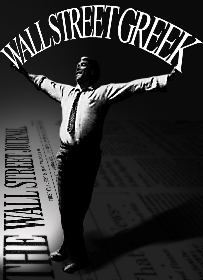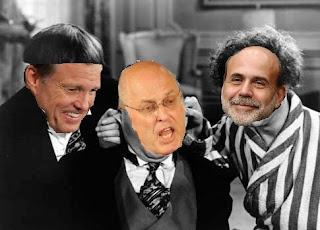Apology for the "Ignorant" Main Street Populist

By Steven C. Ferguson - Econometrics and Programmatic Trade:
Most of us would acknowledge that the political divide in our Country is becoming increasingly caustic. Along with it, there is an ever-sharpening regional divide, in which those who reside in "Blue States" routinely point out demographics of "Red State" inhabitants, uniformly labeling them as ignorant, uneducated, religious fanatics. However, as time passes, a devastating economic divide will transcend both of these schisms and give rise to a powerful populist movement fashioned across political and geographical lines. At the moment, this movement is taking shape as "Main Street" lashes out in all directions, perhaps indiscriminately, at its present enemy on "Wall Street."
(Article interests: AMEX: DIA, AMEX: SPY, Nasdaq: QQQQ, NYSE: NYX, AMEX: DOG, AMEX: SDS, AMEX: QLD, AMEX: XLF, AMEX: IWM, AMEX: TWM, AMEX: IWD, AMEX: SDK)
Any defense of the Main Street populist uprising must start with an acknowledgment that full scale assault on Wall Street as an institution leads to a lot of unfair collateral damage. This is especially true when Wall Street as an institution is personalized in the form of individuals like Mr. Kaminis, who are undoubtedly among the most intelligent, honest and kind people you could ever hope to meet. Obviously these people bear no personal blame for the current banking crisis. But the honest and capable people who comprise parts of the institution do not themselves absolve the institution as a whole from blame.
Main Street populists are also surprisingly quick to identify the many sources of blame behind the distressed debt that our government contemplates purchasing. The common name for the guilty parties is "Them." And the most conspicuous of "Them" all happen to live on Wall Street. What do "They" all seem to have in common? Greed. For those who bought the big house on next to nothing in income, greed was disguised in the form of "The American Dream." For the brokers and real estate agents, who helped propel prices into an unrealistic bubble, "Greed" was disguised as an "opportunity for unlimited income potential." For the blue suit investment bankers, "Greed" goes by the name of "good 'ole capitalism." But it turns out that all of "Them" are susceptible to greed, and yet all universally fail to acknowledge it. That is because "They" are all blind to their own greed. In fact, when is the last time someone confessed: "I have a problem with greed?" Never. But we all remember Gordon "Michael Douglas" Gecko telling us that "greed is good." The problem with that caricature is that it leaves us thinking it so absurd that we could never be guilty of the same belief. And yet even though every Main Street Populist has a little Gecko inside, we all want to make sure he pays for the mess he has created.
Thus, right or wrong, the populist is feeling that a certain amount of retribution is due. But you would have to know his perceived plight in order to understand him and his American Dream that turned into a nightmare. It all started when he and his family went to buy their first house. The realtor told him he had better offer as much as possible because someone else would surely snatch it up. His mortgage broker found an appraiser who told him not to worry about the price: the banker would lend him as much as he needed. Moreover, the house was undoubtedly worth even more than he would offer and would be worth a lot more soon. The inspector that the realtor picked out told him not to worry about all the annoying little defects since his objections might disrupt the deal with the seller. And yet all these people took what seemed to be an exorbitant payday so that he could enjoy his American Dream. The mortgage broker wanted about $4000 for a few hours of work. The realtors wanted their $12,000 for remarkably bad advice. Even the inspector and appraisers took several hundred for several minutes. Worst of all, the banker wants him to pay about $200,000 in interest before he will even own a few hundred square feet.
Three years later, through no fault of his own, the Populists' house is worth a lot less than he paid for it. Strange though: his taxes have not gone down one red cent. The food he buys, he can no longer afford. Keeping the utilities on is a struggle. His insurance premiums are on the rise for some inexplicable reason. And no one is talking to him about any pay raises. Then his interest rate, which he had hoped to lock down on a 30-year mortgage, has now adjusted up several percent. His payments, along with all his other unexpected bills, have become unaffordable. Sure he knew this adjustment was coming, but he thought he could refinance. Only he didn't expect mortgage rates to be going up, since the news had been telling him the government was lowering interest rates and using tax dollars to bail out mortgage lenders. Nor did he expect that his now negative equity makes it impossible to be approved. To top it off, his credit report is spattered with erroneous information from more banks, who then charge him time and money to clear it up.
Finally, out of desperation, he sees an advertisement for the government-sponsored mortgage relief touted by Senators, Treasury Officials and all sorts of public agencies. He sees his bank is on the highly publicized list of participating lenders. He calls the number and they don't offer any relief at all, but want to give him credit counseling. So he decides to call the bank directly to renegotiate his loan only to hear the rude representative tell him he has to be five months in default before they will speak with him. This same bank, which also holds his credit card, starts sending his bill out a few days before it comes due. For some reason, they are changing the due date each month. By mistake, he is one day late on his payment, and he finds they want a $39 late payment along with 17% interest for the entire balance. After a few more months of this, he feels angry and overwhelmed.
Then one day, he begins seeing and hearing everywhere in the main stream news that this bank who has lent him money is about to go under. He reads that Wall Street needs him to bail out all of these banks, as well as the many financial institutions he lumps together with them. He is at once outraged that the institutions who demand ever increasing payments suddenly want their debt problems to be solved... by him. Outrage turns into vengeance and there is a conviction born that no matter the consequences to him, justice can and must finally be served! He and many other populists like him will now have their revenge on the "money changers!"
For the populist, many of whom have already cashed in any 401Ks they were holding for retirement in order to pay bills, life goes on even after the Black Monday on Wall Street. There is no economic collapse. He still is not able to borrow money or refinance his house, so the credit freeze means little to him. Neither is his employer in desperate need of credit to continue his employment. And all these threats of catastrophe, which no one can actually predict or explain with any clarity whatsoever, are just another ploy to get his money. Life goes on for the ignorant populist on Main Street, the same as it did the day before.

Labels: Wall Street




































